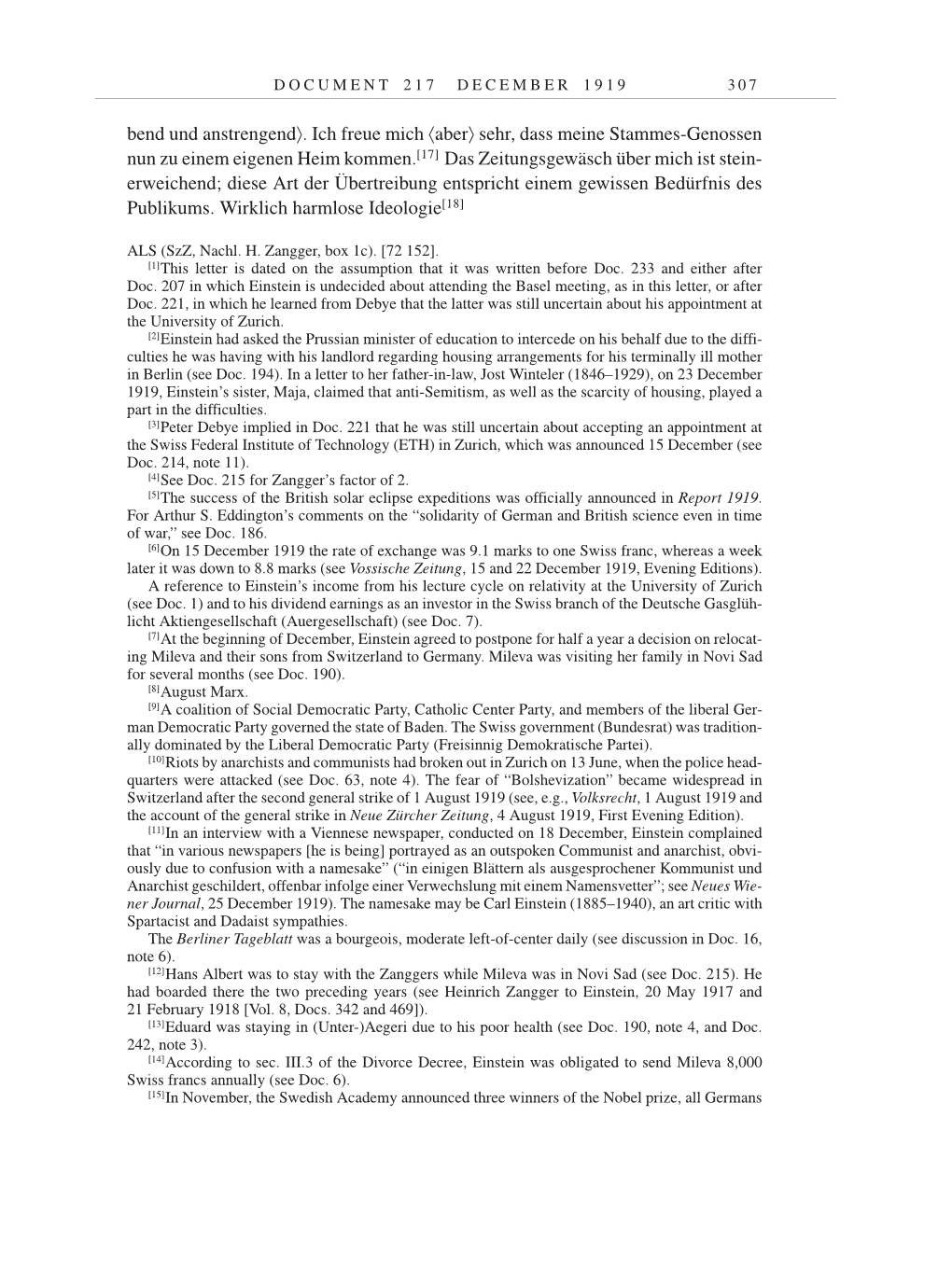D O C U M E N T 2 1 7 D E C E M B E R 1 9 1 9 3 0 7
bend und anstrengend〉. Ich freue mich 〈aber〉 sehr, dass meine Stammes-Genossen
nun zu einem eigenen Heim
kommen.[17]
Das Zeitungsgewäsch über mich ist stein-
erweichend; diese Art der Übertreibung entspricht einem gewissen Bedürfnis des
Publikums. Wirklich harmlose
Ideologie[18]
ALS (SzZ, Nachl. H. Zangger, box 1c). [72 152].
[1]This letter is dated on the assumption that it was written before Doc. 233 and either after
Doc. 207 in which Einstein is undecided about attending the Basel meeting, as in this letter, or after
Doc. 221, in which he learned from Debye that the latter was still uncertain about his appointment at
the University of Zurich.
[2]Einstein had asked the Prussian minister of education to intercede on his behalf due to the diffi-
culties he was having with his landlord regarding housing arrangements for his terminally ill mother
in Berlin (see Doc. 194). In a letter to her father-in-law, Jost Winteler (1846–1929), on 23 December
1919, Einstein’s sister, Maja, claimed that anti-Semitism, as well as the scarcity of housing, played a
part in the difficulties.
[3]Peter Debye implied in Doc. 221 that he was still uncertain about accepting an appointment at
the Swiss Federal Institute of Technology (ETH) in Zurich, which was announced 15 December (see
Doc. 214, note 11).
[4]See Doc. 215 for Zangger’s factor of 2.
[5]The success of the British solar eclipse expeditions was officially announced in Report 1919.
For Arthur S. Eddington’s comments on the “solidarity of German and British science even in time
of war,” see Doc. 186.
[6]On 15 December 1919 the rate of exchange was 9.1 marks to one Swiss franc, whereas a week
later it was down to 8.8 marks (see Vossische Zeitung, 15 and 22 December 1919, Evening Editions).
A reference to Einstein’s income from his lecture cycle on relativity at the University of Zurich
(see Doc. 1) and to his dividend earnings as an investor in the Swiss branch of the Deutsche Gasglüh-
licht Aktiengesellschaft (Auergesellschaft) (see Doc. 7).
[7]At the beginning of December, Einstein agreed to postpone for half a year a decision on relocat-
ing Mileva and their sons from Switzerland to Germany. Mileva was visiting her family in Novi Sad
for several months (see Doc. 190).
[8]August Marx.
[9]A coalition of Social Democratic Party, Catholic Center Party, and members of the liberal Ger-
man Democratic Party governed the state of Baden. The Swiss government (Bundesrat) was tradition-
ally dominated by the Liberal Democratic Party (Freisinnig Demokratische Partei).
[10]Riots by anarchists and communists had broken out in Zurich on 13 June, when the police head-
quarters were attacked (see Doc. 63, note 4). The fear of “Bolshevization” became widespread in
Switzerland after the second general strike of 1 August 1919 (see, e.g., Volksrecht, 1 August 1919 and
the account of the general strike in Neue Zürcher Zeitung, 4 August 1919, First Evening Edition).
[11]In an interview with a Viennese newspaper, conducted on 18 December, Einstein complained
that “in various newspapers [he is being] portrayed as an outspoken Communist and anarchist, obvi-
ously due to confusion with a namesake” (“in einigen Blättern als ausgesprochener Kommunist und
Anarchist geschildert, offenbar infolge einer Verwechslung mit einem Namensvetter”; see Neues Wie-
ner Journal, 25 December 1919). The namesake may be Carl Einstein (1885–1940), an art critic with
Spartacist and Dadaist sympathies.
The Berliner Tageblatt was a bourgeois, moderate left-of-center daily (see discussion in Doc. 16,
note 6).
[12]Hans Albert was to stay with the Zanggers while Mileva was in Novi Sad (see Doc. 215). He
had boarded there the two preceding years (see Heinrich Zangger to Einstein, 20 May 1917 and
21 February 1918 [Vol. 8, Docs. 342 and 469]).
[13]Eduard was staying in (Unter-)Aegeri due to his poor health (see Doc. 190, note 4, and Doc.
242, note 3).
[14]According to sec. III.3 of the Divorce Decree, Einstein was obligated to send Mileva 8,000
Swiss francs annually (see Doc. 6).
[15]In November, the Swedish Academy announced three winners of the Nobel prize, all Germans
